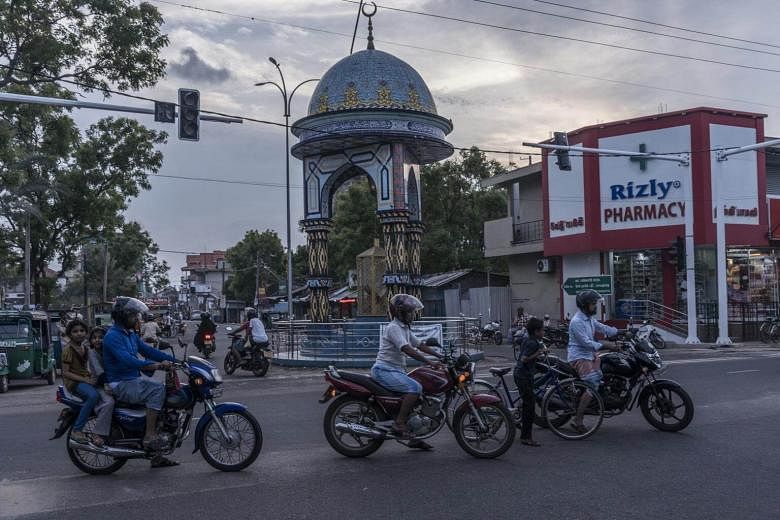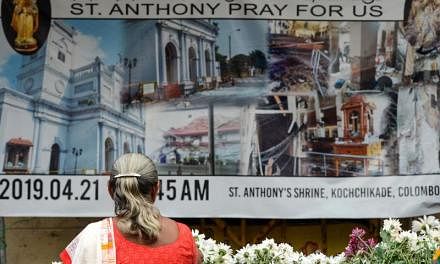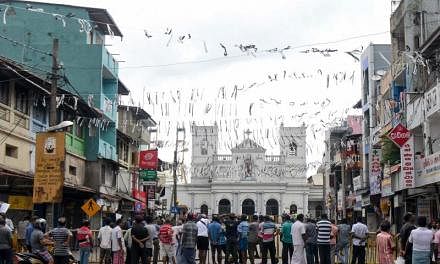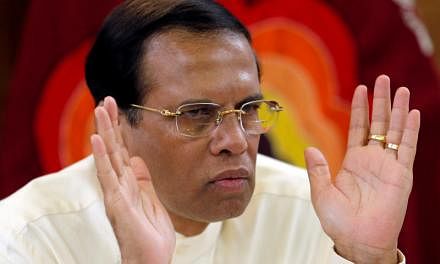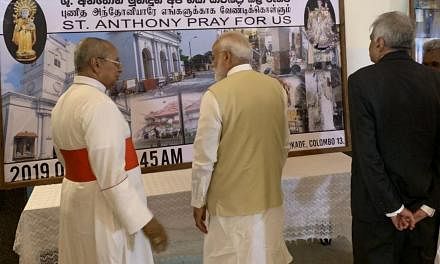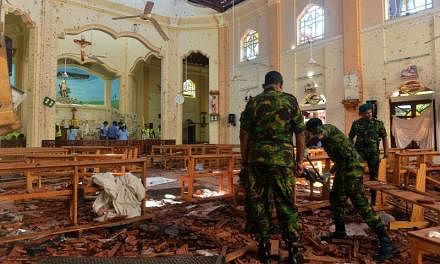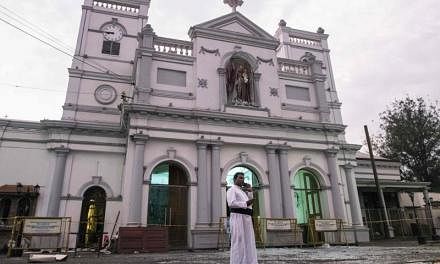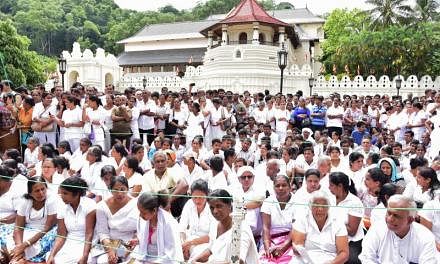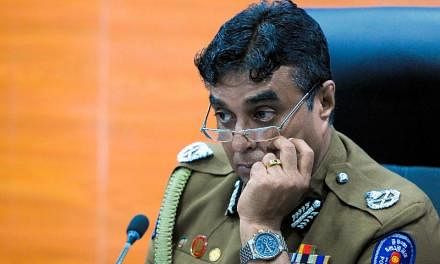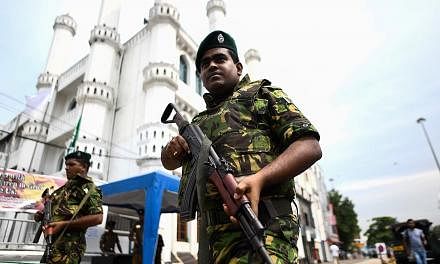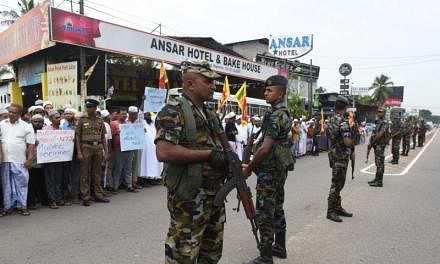KATTANKUDY, SRI LANKA (NYTIMES) - When the Wahhabis came, with their austere ideology and abundant coffers, the town of Kattankudy yielded fertile ground.
In this part of Sri Lanka, faith was often the sole sustaining force during the civil war that raged for nearly three decades. Wahhabism - a hardline strain of Islam blamed for breeding militancy - proposed a direct path to God, albeit one that aimed to return the religion to the time of Prophet Muhammad.
It was here in Kattankudy's warren of homes decorated with delicate swirls of Arabic calligraphy that Zaharan Hashim, the man accused of masterminding the Easter Sunday attacks in Sri Lanka, grew up. And it was here that he preached his ideology, calling for the killing of non-believers in Islam and even other Muslims.
"To be taken over by radicalism, this is not what we want for Kattankudy," said Mr Mohamed Ibraheem Mohamed Jaseem, vice-chairman of the town's urban council. "We are living in Sri Lanka, not a caliphate."
Sri Lankan police say that at least two of the suicide bombers involved in the April 21 attacks, which killed at least 250 people, were from Kattankudy. The Islamic State in Iraq and Syria (ISIS) group claimed responsibility.
Last Friday evening (April 26), just down the coast from the town, a raid on a house linked to the Easter bombings turned violent, leaving 15 dead and wounding the wife and child of Zaharan.
Some of the dead, thought to include Zaharan's brother and other immediate family, blew themselves up as security forces closed in. ISIS also claimed a connection to this shootout.
It was in the 1980s that Kattankudy, one of the few almost exclusively Muslim towns in Buddhist-majority Sri Lanka, began blossoming into a centre of Islamic life. The town was enriched by Saudi money for mosques and madrasahs, work-abroad contracts and university scholarships.
But the advent of Wahhabism, with its isolating dogma, has also shaken this multi-faith island where minority Muslims have traditionally practiced a more inclusive faith. Birthed in Saudi Arabia, Wahhabism's stern intolerance denigrates not only those who don't believe in Islam but other Muslim sects as well.
While Saudi Arabia insists the faith does not call for violence, critics have long blamed the kingdom's mass export of its austere creed for fuelling extremism and terrorism abroad. Al-Qaeda leader Osama bin Laden and most of the hijackers in the Sept 11, 2001, attacks were from Saudi Arabia, and ISIS used Saudi religious textbooks inside its self-styled caliphate in Syria and Iraq.
Today in Kattankudy, stately date palms line the main street, as if this lagoon-filled landscape was a desert oasis. Cafes offer tiny cups of syrupy Middle Eastern coffee along with Sri Lanka's famous tea.
There are more than 60 mosques in Kattankudy for a population of 45,000, and most now subscribe to conservative strains of Islam, including Wahhabism.
At the New Kattankudy Grand Jumma Mosque, designed as a replica of Al-Aqsa Mosque in Jerusalem, one of Islam's holiest sites, construction workers are laying intricate blue mosaics as part of the town's mosque-building boom.
"After the age of seven, everyone must pray five times a day, so we always need more mosques," said Mr M I M Irfan, the mosque's secretary.
In an appeal to the Muslim community that supported his government, Mr Mahinda Rajapaksa, Sri Lanka's former president and an unabashed Buddhist nationalist, came to lay the cornerstone of the Kattankudy Grand Jumma Mosque. Saudi diplomats visited, too.
Faith mingles in Sri Lanka but it also can combust.
Beginning in 2004, Wahhabi-influenced young people from Kattankudy began attacking Sufis, who practice a mystical form of Islam. Grenades were thrown and swords thrust. Hundreds of Sufis were forced from their homes.
Zaharan charged with the anti-Sufi brigade.
Although Kattankudy's Islamic organisations are horrified by Zaharan's militancy and have eschewed violence, most have campaigned for years against Sufis.
"Those people, it is not Islam," said Mr M L M Nassar, a member of the Federation of Kattankudy Mosques and Muslim Institutions. "It's a deviation."
During Sri Lanka's long civil war, which pitted minority Tamils against the Sinhalese majority, Muslims were sometimes caught in the middle. (Accounting for about 10 per cent of the population, Muslims are considered a distinct ethnic group in Sri Lanka.)
Some Tamils, who are mostly Hindus or Christians, considered Muslims to be government collaborators. Some Sinhalese, who tend to be Buddhist, distrusted the fact that Muslims in Sri Lanka speak Tamil and populate some areas where Tamils are clustered.
A Buddhist chauvinism popularised by powerful politicians poisoned relations further.
In 1990, at the height of the terror between insurgents from the Liberation Tigers of Tamil Eelam and a Sri Lankan military accused of slaughtering civilians, worshippers gathered in the evening for prayer at the Meera Grand Jumma Mosque in Kattankudy.
It was dark, just another poor town on Sri Lanka's Tamil and Muslim-dominated east coast bereft of electricity.
Suddenly, gunmen emerged from among the faithful, lobbing grenades and spraying bullets in the sacred space. That night, more than 100 people, many of them children, were killed in attacks on two Kattankudy mosques. The perpetrators were believed to have been Tamil Tigers.
Today, the walls of the Meera Grand Jumma Mosque are still pockmarked with bullet scars, a memory of hatred preserved for each generation to ponder.
Mr M L M Shamsudeen's 13-year-old son was killed in the attack, along with 16 other relatives. He is now a security guard at the mosque where his family was massacred, keeping vigil amid fears after the Easter killings that mosques might be targeted in retribution.
Sitting on the mosque's veranda, his eyes filled with tears for his son. He welled up again when he thought of what a hometown boy, Zaharan, appears to have unleashed at one church in the nearby city of Batticaloa and at two others in or near the capital Colombo.
The talk of jihad emanating from some of Kattankudy's hardline clerics appalled him, he said. Peace finally came to Sri Lanka in 2009. Like so many in the country, Mr Shamsudeen is done with war.
"We had no weapons to fight back then," he said of the attack that killed his son and other family members. "But even if we did, is revenge the best way?"
Mr Shamsudeen did not answer his own question. He shook his head. Just outside the mosque with its bullet-blemished walls, a soldier paced, his rifle alert, a finger poised on the trigger.
